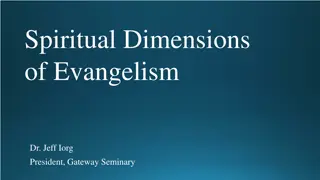Luke's Legal Battle for Proper Care
Luke, a 41-year-old with severe disabilities, challenged the council's decision to cut his care budget by over 42%, risking his wellbeing and established carer team. His complaint led to a Judicial Review, claiming breach of Care Act duties and unreasonable decision-making. The case raises important questions about upholding rights for independent living and community inclusion.
Download Presentation

Please find below an Image/Link to download the presentation.
The content on the website is provided AS IS for your information and personal use only. It may not be sold, licensed, or shared on other websites without obtaining consent from the author.If you encounter any issues during the download, it is possible that the publisher has removed the file from their server.
You are allowed to download the files provided on this website for personal or commercial use, subject to the condition that they are used lawfully. All files are the property of their respective owners.
The content on the website is provided AS IS for your information and personal use only. It may not be sold, licensed, or shared on other websites without obtaining consent from the author.
E N D
Presentation Transcript
North East Lincolnshire Social Work Forum 14 09 2018
Luke: background Luke is 41 years old and has been severely disabled almost since birth; he has quadriplegic cerebral palsy, contractures of hips and knees, hip dislocation, very little trunk control, stretched bowel and hypersensitivity to touch. He cannot bear weight and is dependent on a wheelchair. He has severe visual impairment and is registered blind, although he has some low-vision sight. In the past he has been recorded as having depression, persistent low mood and anxiety. For around 20 years Luke has lived in an adapted, purpose built bungalow in a complex for disabled people. Luke needs help with all intimate personal care, all domiciliary tasks and activities of daily living, including accessing the community. During his time in the bungalow, Luke has had the same team of seven carers, some of whom are his family members. With the exception of Luke s mother, all carers are paid.
Luke: background (2) Luke has received funded support from his council for many years. Until June 2015, Luke s paid-for care costs were 1651 per week (mostly publicly funded with a small contribution from Luke). Changes to the Independent Living Fund (ILF) caused the council to reconsider Luke s package. The council reviewed Luke s needs, revised the care plan, and gave notice of its intention to significantly reduce his personal budget (PB) to 950 per week - a reduction of over 42%. The reduced budget would mean Luke was alone for 6.5 hours per day, in 3 periods of 2 hours (largely to manage toileting). The council gave two primary reasons for the reduction in PB Luke could spend more time alone without the benefit of personal assistants (PA) being present Luke could and should reduce the amount he pays his PAs (in line with national minimum wage).
Luke: claim Luke complained, and then issued proceedings for Judicial Review. Luke claimed (broadly) The council is in breach of its duties under the Care Act - it has failed to properly assess his needs, to consider the impact on his wellbeing of the anxiety caused by spending unwanted time alone, and the risk of losing his established team of carers The council is in breach of its public law duties its decision is so unreasonable that no reasonable council could have reached it. The council had set a budget and revised its view of his needs to fit that budget The council has failed to consider the CRPD (Art 19, the right to live independently and be included in the community)
Luke Listen to Luke s perspective, and the Council s, and make your own judgement
Luke: for consideration You are the judge hearing Luke s application for JR; 1. Do you think the council has sufficiently had regard to Luke s wellbeing (the impact of spending more time alone, a potential change of carers, a reduction in social activities, his toileting needs etc)? 2. Do you think the council has taken reasonable steps to reach agreement with Luke/ his family (as required by the Care Act s27(5))? 3. Has the council evidenced to your satisfaction that the proposed rates for PAs are reasonable? 4. What are the implications of the Convention on the Rights of Persons with Disabilities? 5. Would you decide in Luke s favour, or in the council s? Why?
Luke: outcome There are no ambiguities in the Care Act in respect of which Article 19 might serve as an interpretative tool The assessment duty is an objective duty on the local authority acting via its social workers or OTs (s9(1)) There is no duty to achieve the outcomes which the adult wishes to achieve; rather there is a duty to assess whether the provision of care and support could contribute to those outcomes (s9(4)) If no assessment of the matters specified in s9(4) (including the impact on wellbeing of the matters set out in s.1(2)), then there is a breach of the statutory duty but there was no such breach here Luke would still have opportunities to engage in social activity very limited curtailment does not amount to a breach of s.1 of the Act No evidence that changes to pay/ conditions would result in a break-up of Luke s team; the issue of a different team being a positive move for Luke s independence therefore didn t arise
Luke: outcome (2) The Claimant is in effect saying to the Council (a) some of my carers are not prepared to work for the local going rate; (b) therefore, in order to maintain the continuity which I value, you must set my personal budget at a level which enables me to pay them more than that rate . I do not consider that it is unlawful for the Council to decline to do so Wellbeing has clearly been considered; It does seem counterintuitive to me, at least if one is referring to a complete or substantial break-up of the team who have looked after the Claimant for so long; but I am not an expert in the field, and I cannot possibly say that the view expressed by Ms Lovelock is irrational One must always bear in mind the context of an assessment of this kind. It is an assessment prepared by a social worker for his or her employers. It is not a final determination of a legal dispute by a lawyer which may be subject to overzealous textual analysis. Courts must be wary [ ..] of expecting so much of hard pressed social workers that we risk taking them away unnecessarily from their front line duties
This case has been used as a training tool; check the original for accuracy! R (on the application of Luke Davey) v Oxfordshire CC and (1) the Equality and Human Rights Commission and (2) Inclusion London [2017] EWCA Civ 1308 http://www.bailii.org/ew/cases/EWCA/Civ/2017/130 8.html
Vanessa: background Vanessa is 55; she has muscular dystrophy which is degenerative and incurable. Vanessa is bed and wheelchair bound, unable to weight bear, and has limited dexterity in her hands. Vanessa says she has continuing pain in almost every part of her body and bearing it makes her feel depressed. Vanessa requires support with all personal care; she is continent, but requires support and a hoist to use the loo, and uses pads when carers are not around. A 2011 assessment concluded that Vanessa needed 24 hour care (around 185 hours of care pw). In 2014, the council implemented a care package of 104 hours a week. Shortly after that it arranged installation of a hoist, but did not review Vanessa s needs any further. In 2016, the council reassessed Vanessa and reduced her care package to 52 hours of care pw. This was intended to include removal of her night time care; a pressure relieving mattress and incontinence pads would suffice. This reduction never took effect due to an oversight.
Vanessa: background (2) Vanessa complained about the planned reduction. The council instigated an assessment of night time care needs (inc turning, incontinence and pressure sores) with which Vanessa cooperated, and a MDT met at Vanessa s home to discuss the results/ agree next steps. In 2017 following risk assessment and revision of the care plan, a trial reduction of Vanessa s package took place for 6 weeks, removing the night time care (the mattress and pads being in place). After the trial, the care plan was formally revised to include 40 hours of support for Vanessa; this includes personal care, meal preparation, shopping and cleaning and support to access the community. The council states that its assessments clearly record all Vanessa s needs, and includes a table setting out Vanessa s desired outcomes by reference to the wellbeing factors (especially dignity). It also had MD input.
Vanessa: claim When Vanessa s request to reinstate the package at 104 hours was rejected, she issued proceedings for Judicial Review. Vanessa claimed (broadly) The council s assessment and care plan was unlawful. Its claim that her support could be reduced by more than 50% was irrational, given that her condition is degenerative cogent reasons were required to conclude her needs had reduced when compared with previous assessments The council has failed to give proper consideration to the factors within s9(4) and the wellbeing factors in s1(2), and failed to have regard to the need to prevent additional needs arising (due to a deterioration in wellbeing). Further, it had failed to properly assess her needs against the eligibility criteria.
Vanessa Listen to Vanessa s perspective, and the Council s, and make your own judgement
Vanessa: for consideration You are a council lawyer engaged in a pre-hearing review of Vanessa s application for JR; 1. In reviewing the council s decision, the judge will not be reviewing the merits of the decision, but reviewing it by reference to public law criteria; what are public law criteria in this context? 2. They weren t argued by Vanessa, but what rights under the must be considered here? 3. What the merits of the council s case? What are its weaknesses? 4. What are the merits of Vanessa s case? What are its weaknesses? 5. On the basis of the evidence presented, how do you rate the council s chances? Why?
Vanessa: outcome The duty to meet assessed eligible needs is absolute; regardless of a council s resources, but it may take into account its resources in assessing [how, rather than whether, to meet need] Where the existence or non-existence of a fact is left to the judgment and discretion of a public body and that fact includes a broad spectrum ranging from the obvious to the debatable to the just conceivable, the duty of the court to leave the decision of that fact to the public body to whom parliament has entrusted the decision making power save in a case where it is obvious that the public body [ ] are acting perversely Case law warns against over-zealous textual analysis and indicates that a social workers assessment should be constructed in a factual way with a view to finding the real substance of the decision
Vanessa: outcome (2) The council has taken into account Vanessa s need for pain management; there is no evidence that the pain relates to the provision or otherwise of night time care The night time care was previously provided to meet toileting and turning needs, not to provide companionship. Vanessa has been supported to access social support in other ways e.g. her church The council involved Vanessa and a multi-disciplinary team in reaching conclusions, trialled the reduced package, and has kept it under close review There is little or no evidence that the reduction has had a significant impact on Vanessa s wellbeing Viewing the decision in the round, the council has had regard to all Vanessa s circumstances including that her condition is degenerative - and taken into account all her needs and her wellbeing
This case has been used as a training tool; check the original for accuracy! R (on the application of VI) v London Borough of Lewisham [2018] EWHC 2180 (Admin) http://www.bailii.org/ew/cases/EWHC/Admin/2018/ 2180.html
Darren: background Darren is 44 years old; he has a severe learning disability and autism. In its assessments and support plan, the council notes Darren is unable to communicate his wishes and needs and relies on others to interpret these by their knowledge of him and observing his body language and changes in behaviour and It is important for Darren to have his own space and to be able to remove himself from noise and sensory stimulation that he is sensitive to . Darren had lived in a residential care home since 1999. When this closed unexpectedly in 2015, Darren was moved to supported living. The short notice of closure did not provide for any detailed planning. The council did not undertake a best interests meeting at the time of Darren s move, because Darren s family did not object to the move, and there was no available alternative accommodation. Following the move, Darren displays increased levels of distress. Darren s brother Barry belatedly discovers that Darren has been prescribed anxiety medication by his GP; he is cross that he wasn t consulted, and thinks the meds are giving Darren trouble sleeping.
Darren: background (2) Barry and Darren s sister Tracey look for alternative accommodation and identify a residential home specialising in autism care. This home is familiar to Darren as he previously attended it for day care. Barry and Tracey feel this home will meet Darren s needs, and offer a suitable long term option which would improve Darren s mental health. Barry and Tracey also have some concerns about the care at his current placement, which the Council asked the support living provider to address. The Council agreed to consider all alternative accommodation options for Darren, including the care home identified by Barry and Tracey. The council sent a pen picture of Darren to two proposed providers (Barry/ Tracey s preferred option, and a supported living provider) enquiring how both proposed to meet his needs. The Council received information from both providers. It visits the Barry/ Tracey s preferred option with them, and this home subsequently offers Darren a place.
Darren: complaint The information relating to the supported living facility shows it provides care for people with a range of learning disabilities; it has one resident who makes noise but who has a sound-proofed room. The Council considers that the supported living option provides the most detailed and person-centred approach ; it further says the client mix at the supported living facility is compatible with Darren s needs. Barry and Tracey visit this provider and another supported living provider, but still prefer the specialist care home. Whilst the dispute as to the best place for Darren continues, he remains in his current supported living placement. It is three years since Darren moved in. Barry complains to the Ombudsman.
Darren Listen to what Barry has to say and then think about the Ombudsman s possible response
Darren: for consideration You are creating a response on behalf of the Ombudsman; consider: 1. Following Darren s move at short notice, what actions would you have expected the Council to take? 2. How would you have expected the Council to evidence compliance with the Mental Capacity Act 2005? 3. What concerns do you have around Darren s medication for anxiety? 4. How would you expect the Council to consider the options before it, including the information from the providers which received the pen picture ? How would you expect the Council to consider best value? 5. What remedy do you suggest for the delay in securing a suitable placement for Darren?
Darren: outcome The Council should have assessed Darren s needs and held a best interests (BI) meeting following the move. It should have held a formal planning meeting with professionals and Darren s family to consider the longer-term options. The subsequent dispute should also have triggered a further BI meeting The Council failed to consider the long-term suitability of the initial placement; it assumed that because residents Darren was familiar with moved with him, the placement would be suitable. This was a very different placement from the one Darren had been settled in. The Council had no solid basis to evidence it was or is a suitable placement The Council did not respond to Darren s anxiety; this should have warned it the placement may not be suitable. Darren s medication may have provided symptomatic relief, but the Council failed to give any consideration to the cause. It should have reassessed him at this time The Council did not properly take into account the views of Darren s family, and did not consider all options equally. There was no proper consideration by the Council of whether supported living is suitable for Darren, beyond noting that the supported living provider gave a longer response. The response from the residential placement contains less detail about day to day care but demonstrates it provides specialised care for autism only. To favour one placement at this time is premature
Darren: outcome (2) The Council said it had to be mindful of considering best value options whilst ensuring sustainability to meet eligible need. Best value is not meant to be about always finding the cheapest option. The Council cannot not dismiss the option of residential care because it is more expensive The Council failed to establish a way forward, resulting in unacceptable delay. The Council should Within four weeks of the LGO decision, arrange a best interests meeting to make a decision (taking into account OT assessments of the options, and the views of Darren s family) Pay Darren 3,000, made up of 1,000 for each year he has been in accommodation not confirmed as suitable for his needs provide a written apology to Barry for the faults identified and pay him 250 for his time and trouble pursuing the complaint
This decision has been used as a training tool; check the original for accuracy! Gloucestershire CC (17 011 182) https://www.lgo.org.uk/decisions/adult-care- services/residential-care/17-011-182


![READ⚡[PDF]✔ European Mail Armour: Ringed Battle Shirts from the Iron Age, Roman](/thumb/20552/read-pdf-european-mail-armour-ringed-battle-shirts-from-the-iron-age-roman.jpg)




















